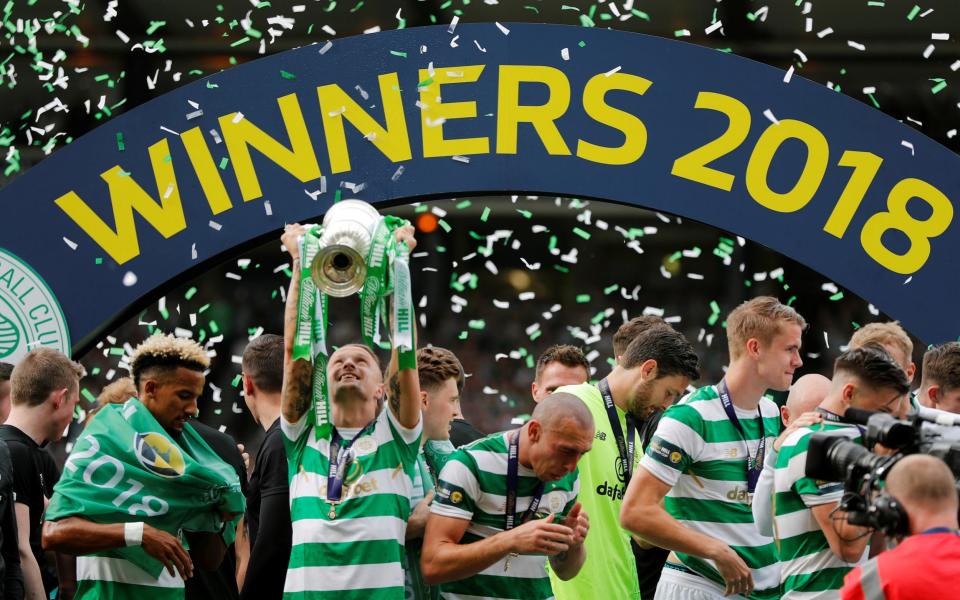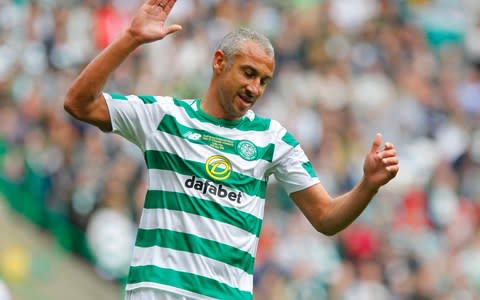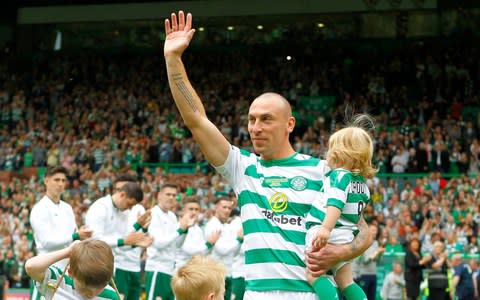Martin O'Neill praises Celtic's stunning achievements but says European success needs to follow

Sunday was fiesta day in the east end of Glasgow, despite the absence of the beatific sunshine that bathed Hampden Park on Saturday, when Scott Brown captained Celtic to the unprecedented feat of a second successive clean sweep of the Scottish honours.
Immediately after the 2-0 victory over Motherwell in the William Hill Scottish Cup final, the skipper and his team mates returned to Parkhead on an open-top bus to bask in the adulation of their massed support.
Scarcely had the streets cleared after those celebrations than the throngs reassembled to salute Brown in his testimonial match against the Republic of Ireland, a choice of opposition wholly appropriate to the green arena of Celtic Park. The Irish, of course, were under the supervision of Martin O’Neill, whose presence was particularly timely on the eve of the 15th anniversary of Celtic’s Uefa Cup final in Seville.
On that sweltering Spanish night Henrik Larsson scored twice and, to the rapture of the home crowd, the Swede appeared for yesterday’s warm-up with Brown and the other Celtic players. In 2003, Larsson’s contribution was ultimately insufficient to overcome Jose Mourinho’s Porto side, who went on to win the Champions League the following season.
Thwarted they may have been, 15 years ago, but the presence of O’Neill and Larsson evoked potent memories of an era and targets that look out of reach for this Celtic generation. European football has changed beyond recognition as it proceeds, seemingly inexorably, towards a league of billionaire clubs whose schedule will displace national structures in the calculations of broadcasters and sponsors.
Against the background of such a narrowing trend, Celtic’s acquisition of a double treble of domestic prizes – secured by Saturday’s victory over Motherwell – can be disdained by outsiders as irredeemably parochial. The response of the Celtic faithful, however, must be set within a tradition of lustrous achievements, the greatest of which was the 1967 European Cup triumph in Lisbon.

The exodus in 2003 from Glasgow to Spain of an estimated 80,000 fans – only half of whom had tickets for the final – testified to a craving for the restoration of European status and was nourished on the road to Seville by victories over the likes of Blackburn (then a power in England), Liverpool and Vfb Stuttgart. The sheer scale of the migration – like that of Rangers to Manchester for the 2008 final in Manchester – is indicative of a priceless seam of passion devalued by the overweening self-regard of the continental powers.
Similar devotion was in evidence for Brown’s celebratory match, which drew a crowd of 55,000, including a healthy contingent of kids being taken to see Celtic for the first time. The size of the attendance gratified the skipper, whose accumulation of club honours now totals eight league titles, four Scottish Cup medals and four Scottish League Cup successes, which makes him the most decorated Hoops captain after Billy McNeill.
The considerable crowd also provided significant donations to a clutch of Brown’s favoured charities, as well as support for the family of the former Celtic and Republic of Ireland midfielder, Liam Miller, who died of pancreatic cancer last year at the age of 36. The teams then played out a decorous friendly which finished 2-2 although, in the closing minutes, Larsson had the opportunity to consummate the adoration enveloping him when he struck a free kick from the edge of the Irish box, only to shank it high into the stand behind the goal.
After the revels, O’Neill – the last Celtic manager to win the Scottish treble before Rodgers – assessed the quality of his successor’s feat. “It’s extremely difficult to do what Celtic have done. Even the great Jock Stein had difficulty with it,” he said.

“To do it twice on the trot is excellent. They have deserved it and played some really decent football.
“The next step now is to try to achieve success in Europe and it would be nice - imagine me saying this - if Rangers could get stronger. That might be on the cards. A good, strong Rangers is good for the league - and actually, it will benefit Celtic.
“Celtic don't rest on their laurels in Scotland but, if the competition gets stronger, they will rise to it.
“Steven Gerrard was a brilliant player and that doesn’t always materialise into being a brilliant manager, but he has all the attributes and he wants to have a go. And why not?”
Mention of Seville triggered powerful recollections for O’Neill. “Henrik Larsson played his best ever game for Celtic and to lose it in extra time...well, ‘disappointing’ wouldn't describe it,” he said. “But it's still spoken about and just getting there was great.
“We went down to Blackburn and it very much was men against boys at Ewood Park. To then beat Liverpool at Anfield was fantastic. We shouldn’t really forget those games on that journey - and that hot evening in Seville will live with me forever.”
As it thrives in the memories of the Celtic support who, for all their team’s domestic hegemony, increasingly yearn for Rodgers to transplant some part of it to foreign fields.

 Yahoo Sport
Yahoo Sport 





































